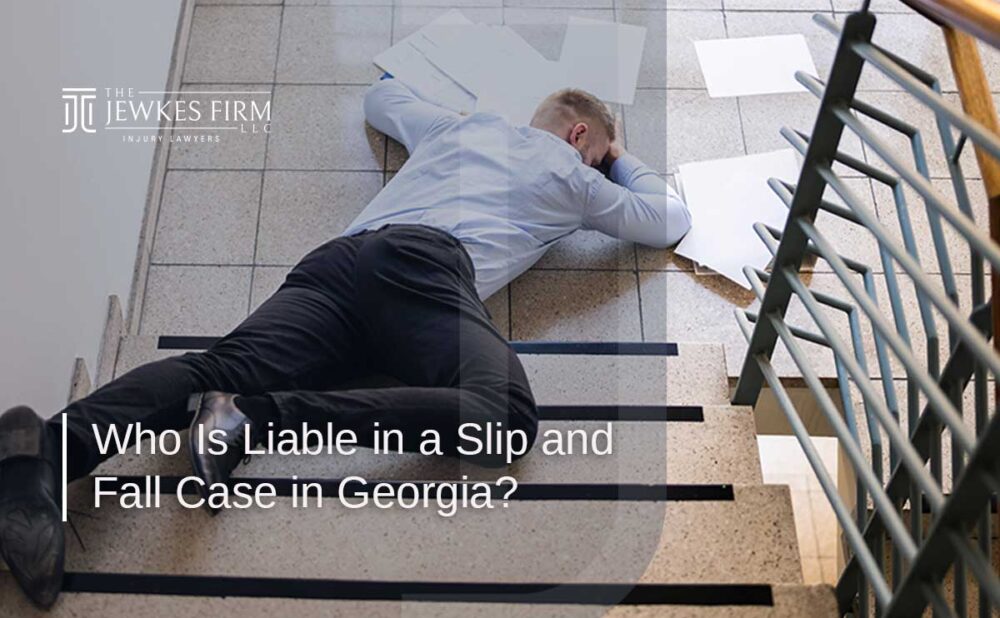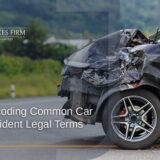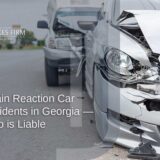Who Is Liable in a Slip and Fall Case in Georgia?
Slip and fall incidents rank among the most common personal injury claims in Georgia. Slip and fall accidents can happen anywhere — a grocery store, a restaurant, a friend’s home, or even on a public sidewalk.
If you’ve been injured in such an incident, understanding who may be held liable is crucial to pursuing a successful claim. At The Jewkes Firm, Attorney Jordan Jewkes helps victims navigate these complex legal issues and secure the justice they deserve.
Understanding Premises Liability in Georgia
A slip and fall case is a type of personal injury claim that arises when someone slips, trips, or falls due to a hazardous condition on someone else’s property. In Georgia, slip and fall accidents fall under the umbrella of premises liability law. This legal doctrine holds property owners responsible for maintaining safe conditions for visitors.
Who Can Be Held Liable in a Slip and Fall Case in Georgia?
In Georgia, liability in slip and fall cases depends largely on the relationship between the injured party and the property owner, as well as the circumstances surrounding the accident. Potentially liable parties include:
Property Owners
Individuals or entities that own the property where the accident occurred. Property owners have a legal duty to keep their premises reasonably safe for visitors. This includes fixing dangerous conditions or warning visitors about hazards. If a property owner knew or should have known about a dangerous condition and failed to address it, they may be held liable.
Property Managers
Entities responsible for the day-to-day maintenance and operation of the property. In many cases, property owners hire managers or landlords to maintain the property. These parties can also be liable if they neglect their duty to inspect and repair hazardous conditions.
Occupants and Tenants
Individuals who lease or occupy the property and have control over certain areas.
Independent Contractors
Third parties hired to perform maintenance or repairs who may have contributed to the hazardous condition.
Businesses and Employers
Businesses open to the public, such as stores, restaurants, and offices, owe a duty of care to customers and employees. If a business fails to clean up spills, repair broken steps, or provide adequate lighting, it may be responsible for slip and fall injuries.
Government Entities
When a slip and fall occurs on public property, such as sidewalks, parks, or government buildings, liability may fall on the city, county, or state government. However, suing a government entity involves special procedures and strict deadlines.
Injured In A Slip And Fall? Contact Us For A Free Consultation
Injured In A Slip and Fall?
Legal Status of the Visitor
Georgia law classifies visitors into three categories, each with different levels of duty owed by the property owner:
- Invitees. Individuals present for business purposes (e.g., customers, employees). Property owners owe invitees the highest duty of care, requiring them to maintain safe conditions and warn of known hazards.
- Licensees. Individuals allowed on the property for social reasons (e.g., guests). Owners must refrain from willfully or wantonly injuring licensees and must warn them of known hazards.
- Trespassers. Individuals who enter the property without permission. Property owners owe the lowest duty, primarily to avoid willfully or wantonly injuring trespassers.
Key Factors in Proving Liability
Georgia law requires that the injured person prove the property owner or responsible party was negligent. This generally means showing:
- Existence of a Hazard. A dangerous condition (e.g., wet floor, uneven pavement) was present on the property.
- Owner’s Knowledge. The owner either knew or should have been aware of the existing hazard.
- Failure to Address Hazard. The owner did not take appropriate actions to rectify or provide warnings regarding the danger.
- Causation. The hazard directly caused the injury.
Georgia’s Comparative Negligence Rule
Georgia follows a modified comparative negligence rule. This means that if the injured person is found to be partially at fault for the accident (for example, by not paying attention or wearing inappropriate footwear), their compensation may be reduced proportionally. However, if the injured party is more than 50% at fault, they cannot recover any damages.
Statute of Limitations
In Georgia, the statute of limitations for filing a premises liability claim is generally two years from the date of the injury. Failing to file within the designated timeframe may result in forfeiting your right to seek compensation.
Defenses Property Owners May Assert
Property owners may raise several defenses including:
- Lack of Knowledge. Arguing they were unaware of the hazardous condition.
- Open and Obvious Hazard. Claiming the hazard was so apparent that the injured party should have avoided it.
- Contributory Negligence. Suggesting the injured party’s actions contributed to the accident.

GEORGIA PERSONAL INJURY LAWYER NEAR ME
Why You Need a Skilled Slip and Fall Attorney
Slip and fall cases can be complicated. Property owners and their insurance companies often try to minimize or deny liability. The Jewkes Firm advocates for individuals injured due to the negligence of property owners. With a deep understanding of Georgia’s premises liability laws, we strive to secure fair compensation for our clients. If you’ve experienced a slip and fall accident, contact us at (770) 771-5130 for a free consultation.
Frequently Asked Questions
What must I prove to win a slip and fall case in Georgia?
You must show that the property owner was negligent by having actual or constructive knowledge of the hazard, failing to address it, and that this caused your injury.
How does Georgia’s comparative negligence law affect my slip and fall case?
Georgia follows a modified comparative negligence rule. If you're partially at fault, your damages may be reduced. If you're 50% or more at fault, you cannot recover compensation.
What is the deadline to file a slip and fall lawsuit in Georgia?
You generally have two years from the date of the injury to file a premises liability claim in Georgia. Failing to file can hinder your chances of receiving compensation.
Can property owners claim defenses in a slip and fall case?
Yes, property owners may claim defenses such as lack of knowledge of the hazard, or that the hazard was open and obvious. An experienced attorney can counter these defenses on your behalf.
How soon should I contact an attorney after a slip and fall accident?
It’s best to contact an attorney as soon as possible to preserve evidence, meet legal deadlines, and build a strong case.
Can I sue a government entity for a slip and fall accident in Georgia?
Yes, but suing a government entity involves special procedures and strict deadlines, so it’s important to consult an experienced attorney promptly.




